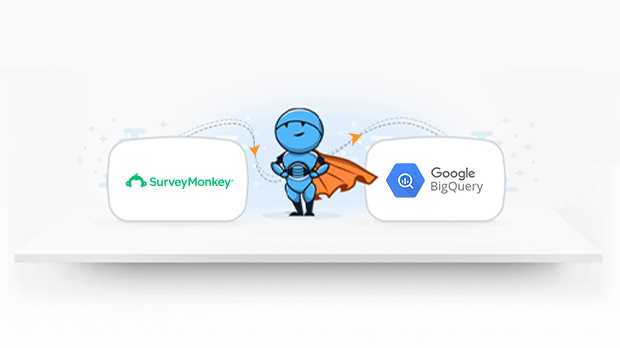Replicate SurveyMonkey to BigQuery in minutes
SurveyMonkey allows organizations to collect feedback and share insights, so they can provide better experiences to their customers, employees, prospects, and communities. When it comes to understanding and making decisions from your survey responses along with the data from other sources it is necessary to have access to analysis-ready data at any point in a scalable data warehouse like BigQuery. Replicate your SurveyMonkey data to BigQuery in minutes for making better business decisions without wasting your time crunching the data. Make the necessary data available at your analyst’s fingertips to access, analyze, and report this data at scale.
In this article, we will give a brief overview of SurveyMonkey and BigQuery, the importance of integrating your data to BigQuery, and finally two approaches to moving your data from SurveyMonkey to BigQuery.
Why integrate SurveyMonkey to BigQuery
When it comes to understanding and making decisions from your survey responses, SurveyMonkey’s analysis features provide enough analytical data to better understand your customers. But if you’re looking to go beyond Surveymonkey’s analytics, and uncover more insights then integrating your SurveyMonkey data into BigQuery is the right approach. With your SurveyMonkey data streamlined with a high-performance cloud warehouse like BigQuery, you can run anything from complex ad-hoc queries to standard reporting, and easily combine SurveyMonkey’s data with other data sources to take your analysis further and help you grow your business by making better business decisions.
SurveyMonkey Overview
SurveyMonkey is the world’s leading cloud-based survey software to create and run professional online surveys. It helps create surveys, collect responses and analyze survey results. SurveyMonkey presents all the tools necessary for you to create strong, professional surveys easily. With SurveyMonkey, users can email surveys to respondents and post them on their websites and social media profiles to increase the response rate. Users can also run customer satisfaction surveys to get feedback on products and services.
BigQuery Overview
Google BigQuery is a serverless data warehousing platform where you can query and process vast amounts of data. It is fully managed and performs storage optimization on existing data sets by detecting usage patterns and modifying data structures for better results. The best part about it is that one can run multiple queries in a matter of seconds even if the datasets are relatively large in size. BigQuery is a powerful tool for business intelligence and it offers analytics capabilities to organizations of all sizes.
How to replicate SurveyMonkey to BigQuery
Here’s an overview of the two approaches you can use to replicate SurveyMonkey data to BigQuery. This will allow you to evaluate the pros and cons of both and choose the one that best suits your requirement.
Build your own Data Pipeline
This process needs a lot of experience and consumes a lot of time and manpower. The chances of errors are more due to multiple integrated steps to be executed one after the other. You need to extract data using SurveyMonkey APIs & then connect it properly with the BigQuery data warehouse. This whole process to build a custom data pipeline is cumbersome.
Use Daton to integrate SurveyMonkey and BigQuery
Integrating SurveyMonkey and BigQuery with Daton is the fastest & easiest way to save your time and efforts. Leveraging an eCommerce data pipeline like Daton significantly simplifies and accelerates the time it takes to build automated reporting.
Configuring data replication on Daton only takes a few minutes and a few clicks. Your analysts do not have to write any code or manage any infrastructure, yet you can get access to SurveyMonkey data in a few hours.
Daton’s simple and easy-to-use interface allows analysts and developers to use UI elements to configure data replication from SurveyMonkey data into BigQuery.
Daton takes care of:
- Authentication
- Rate limits
- Sampling
- Historical data load
- Incremental data load
- Table creation, deletion, reload
- Refreshing access tokens
- Notifications
and many more important functions for data analysts to focus on analysis rather than worrying about the data migration.
Steps to integrate SurveyMonkey with Daton

- Sign in to Daton
- Select SurveyMonkey from the integrations page
- Provide Integration Name, Replication Frequency, and History. Integration name would be used in creating tables for the integration and cannot be changed later
- You will be redirected to SurveyMonkey log in for authorizing Daton to extract data periodically
- Post successful authentication, you will be prompted to choose from the list of available SurveyMonkey accounts
- Select required tables from the available list of tables
- Then select all required fields for each table
- Submit the integration
Sign up for a trial of Daton Today!
Here are more reasons to explore Daton for SurveyMonkey to BigQuery Integration
- Faster integration – SurveyMonkey to BigQuery is one of the integrations Daton can handle very conveniently and seamlessly. By following few steps you can easily connect SurveyMonkey to BigQuery.
- Low Effort & Zero Maintenance – Daton automatically takes care of all the data replication processes and infrastructure once you sign up for a Daton account and configure the data sources. No need to manage infrastructure or write manual code.
- Data consistency guarantee and an incredibly friendly customer support team ensure you can leave the data engineering to Daton and focus on analysis and insights!
- Enterprise-grade data pipeline at an unbeatable price to help every business become data-driven. Get started with a single integration today for just $10 and scale up as your data needs grow.
- Robust Scheduling Options: This allows you to schedule jobs based on their requirements using a simple configuration step.
- Support for all major cloud data warehouses including Google BigQuery, Snowflake, Amazon Redshift, Oracle Autonomous Data Warehouse, PostgreSQL, and more.
- Flexible loading options allow to you optimize data loading behavior to maximize storage utilization and ease of querying.
- Enterprise-grade encryption gives your peace of mind
- Support for 100+ data sources – In addition to SurveyMonkey, Daton can extract data from a varied range of sources such as Sales and Marketing applications, Databases, Analytics platforms, Payment platforms, and much more.
Using a fully managed, zero maintenance, and easy-to-use data pipeline like Daton, you can replicate your SurveyMonkey data to BigQuery in a fully automated and secure manner without having your engineering team write and maintain any code.
For all sources, check our data connectors page.
Other Articles by Saras Analytics,
- Automated Data Analytics
- Product Listing Ads (PLA)
- Product Sequencing in eCommerce
- Advanced Analytics in Merchandising
- User and Marketing Event Tagging













